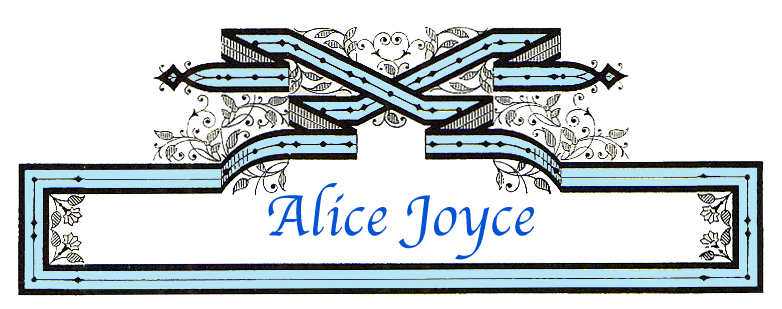

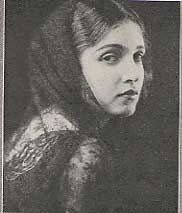 |
|
| Photograph by Bangs |
Alice Joyce has a natural dignity that is as a raised, arresting hand. She is of gracious manner, with the graciousness of one who softly, smilingly closes a door ... a mistress of the fine art of self-withdrawal
Behind the eyes that Griffith called wonderful, there lies a gentle doggedness. It serves her well, so well that in a popularity contest she was conceded to be third in the list of America's most popular actresses.
A study in inscrutability--a delightful word photograph of a much-beloved star.
By Ada Patterson
Victor Hugo told the world that there is nothing as fascinating as a wall which may not be passed. I thought of the French genius and his sage conclusion the first time I met Alice Joyce
The tall, slender girl with the eyes of autumn leaf brown grazes inscrutability. She is a woman of vast silences. Persons who surround her with chatter seem as so many magpies. Yet, she, without a word, holds the situation. She has a natural dignity that is as a raised, arresting hand. She is of gracious manner, with the graciousness of one who softly, smilingly closes a door. She is a mistress of the fine, protective art of self-withdrawal.
In the days of her artistic beginnings she went to the Biograph Studio. It was while David W. Griffith was its king. She was led before a tall man who sat on a high stand and wore a large felt hat and talked through a megaphone. She stood and looked up at him, Alice-Joycelike, she said not a word. He said: "Come on in the crowd just as you are." The girl tenderfoot in the new land of the screen construed literally his words. She joined the group. He called through the megaphone: "Go and be made up." A girl actress powdered her plentifully and she returned. Bt by that incident, her silence and the gaze of her large, unfathomable eyes, the star of her hopes to go with the Biograph stock company to California set.
"Juno?" said the rising sun of shadow land. "The girl that reminds me of a cow? She has wonderful eyes but nothing behind them. We won't take her. Strike her name off the list.
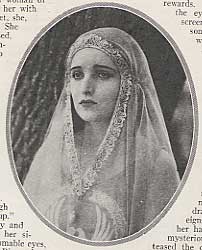 |
Crushed but not beaten the girl went back to the studios of the illustrators. While she posed at fifty cents an hour for C.D. Williams, for Charles Gilbert and Edmund Magrath and in the styles for the commercial photographers, she thought of the motion picture studios and their greater rewards. In this she revealed what was behind the eyes that the great impresario of the screen had granted were wonderful. That something, lodged where he had thought was vacuity, was a gentle doggedness. It is still hers. Well it has served her, so well that in a recent popularity contest she was conceded to be third on the list of most popular actresses in America. The first according to the vote was Mary Pickford. Second, by that rating was Maude Adams. Followed, Alice Joyce.
One remembers Alice Joyce for the reason that one cannot forget her. After one meeting at the hotel which she has bought with her star dust I thought often of her. I wanted again to see her. I craved more knowledge of her. This not because she is a star of the first magnitude in the screen heavens. It has not been given me to see many photodramas nor to know many of the sovereigns of shadow land. It was because of her haunting personality. Because she is a mysterious, elusive young woman. Because she teased the character student in me into pursuit. Because she was "hard to get at," therefore of hundred woman power interest. A will o' the wisp or a softly shining planet, obscured often by her myriad reticences--which?
I contrived it--a glimpse over "the wall that could not be passed." And these are what I saw, the things that lay behind the eyes that are as none others. I repeat it, as none others. For this I have the corroboration of a weatherbeaten woman who sells postcards of stars of the screen and stage.
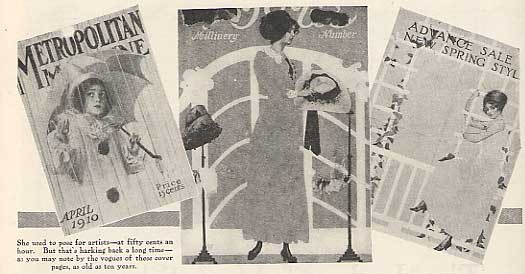 |
|
| She used to pose for artists--at fifty cents an hour. But that's harking back a long time, as you may note by the vogues of these cover pages, as old as ten years. |
"That's Alice Joyce," she said. "There's pretty ones and there's grand ones and there's great ones, but there's something in her eyes that none of the others has.
In the peep over "the wall one cannot pass" I found a spirit that is habitually gentle but that once in a rare while rises and flames and blazes in defense of its own. I beheld, looking past that war, two children at war in a garden. It was a vegetable garden. To be accurate, as the writing person should, the particular portion in which the fray occurred was an onion patch. The combatants were a two-headed boy of five and a thin little girl of eight. The girl was winning the war. By well administered cuffs and kicks punctuated by angry cries, she was winning it.
""Will you stop calling me 'scarey eyes'? I can't help it if they're big and scarey looking. They're all I've got." A reminder from a boot tipped with brass. If you don't quit saying my mouth's too big for my face and my teeth stick out I'll bite you with them" A shower of tears. "Don't you ever say another word about my hands and feet. 'Tain't my fault they're big. Will you promise? Then get up."
It was Alice Joyce's first big emotional scene. The villain whom she worsted and reformed was her brother Frank. Then her tormentor, now her most profound admirer.
So Miss Joyce has always turned upon adverse fate when it was too painful to be accepted.
Another glimpse behind the wall and the eyes unique revealed a habit of decision that has worked for her weal. As when she was a pig-tailed, short-skirted stock girl in a department store and asked for a 'book." A term in department store vernacular that signifies that the stock girl believes herself entitled to the honors and emoluments of the saleswoman. The head of the department surveyed her high boots and short skirts, sniffed her atmosphere of unimpressive youthfulness and said "No." Upon which the aspiring youngster said something that rhymed with 'No" and as snappy. It was "Then I will go."
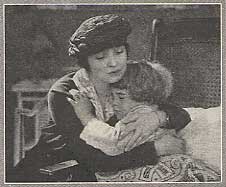 |
|
| She has been called the screen's Madonna. "I should be sorry," she said, "if I thought I would have no more children." |
She had heard of what is advertised as "the ideal occupation for women," the symbol of which is the switchboard. She would an operator be. Having qualified and equipped herself for the said-to-be-ideal occupation she was installed as an operator in a smart Broadway hotel. A male guest tarried beside the switchboard inviting her to dine with him. Mindful of her mother's warning she said what the head of the department said when she wanted a "book," It was a round, positing, unmistakable monosyllable, such a "No" as one Captain Myles Standish dreaded.
He next employment was with a man-hating female celibate. The guest shunned the switchboard save for telephoning. There was good reason. The hotel proprietor was vigilant. The penalty for attempted flirtation would have been an immediate eviction. Alice Joyce remained for three untroubled seasons. A hotel season is from autumn until summer. The three months must be filled.
She went a-modeling. Then came the three-day Biograph attempt and failure. A Kalem studio man saw reproductions of her poses in the studios. His pictures caused a summons from the Kalem company. She was engaged for "The Engineer's Sweetheart." "Do you ride?" "Yes," she answered, refraining from details. The details would have been of five-minute rides on the back of a weary plow horse from a Virginia field to the water trough. In pursuit of her new profession she galloped on a spirited steed across recurrent and seemingly endless car tracks. She fell off three times. Her bruises were large and livid and past counting. her mother applied liniment and tears.
The next day Miss Joyce limped back. She limped through the week. Her gentle doggedness had been crowned by a gold coin. The reward for her services that first unforgettable day should have been five dollars but because of the horse and the falls and the bruises and her dry eyed victory it was ten. Success beckoned her. She went to the land forbidden her by the Biograph. She soon became a personage in picture land.
California was a fairyland that stirred memories of her childhood, a warm emotional, beauty loving childhood. But not a soft one. He father and mother had separated. Her mother had turned seamstress. The small Alice spent hours of silent delight in the workroom, caressing brilliant bits of cloth. One day she broke her usual silence.
"Look, Mother! Lovely!" Her mother went to the window. The small girl stood enraptured before an effect she had produced. With a scrap of red calico she had in part covered a cluster of growing violets.
"Yes, dear, Beautiful!" Her tired mother went back to he work saying "I shouldn't wonder if Alice would be a dressmaker too."
Tastes are character indicators. Further peering over the Joyce wall revealed that she likes old friends best; that friendships mean much to her; that the qualities she seeks in a friends are sincerity, frankness, simplicity.
She has a gentle, impersonal satisfaction in her deserved fame. But it is impersonal.
"The year that I left the screen and stayed at home to take care of my baby Alice I learned a great deal" I heard her say: "When I met persons and was introduced as Mrs. Moore people paid very little attention to me. If someone said 'That is Alice Joyce,' it was very different. It was chastening to know that as myself I didn't interest the passing crowd."
She was Mrs. Tom Moore. Was, not is, for two years ago the New York courts severed their bonds at her request.
"I brought the suit because my husband requested it," she said. "Afterwards he changed his mind but the suit had gone too far. It was better for our daughter. It is better that a child should have half a home or rather two homes, than that she should live in an inharmonious atmosphere. Mr. Moore is a fine actor and a fine man. But our tastes and habits were different. We became like strangers. Alice is devoted to him. When we are both in the city we go to plays together. We are friends."
The future of Alice Joyce is like herself, nearly inscrutable. There remains two years of a contract with the second company that her talents have served, the Vitagraph. Her art has steadily and swiftly improved. She has a huge following. The Joyce "fan" waves in a continuous breeze. Her future rests in great part with herself. When her contract expires will she retire, at thirty-one, to a new alliance and a new domesticity? A strong, almost fierce maternal instinct, hides behind the eyes of "Juno," "I should be very sorry if I thought I would have no more children," she has said. But she believes that divided interest means only partial realization of potentialities.
"I don't know just what I want" she says. "I do know that whatever the picture I have done I always want to do better. I always have a sense that there is something better farther on.
One of the famed Vienna bronzes is of a prostrate woman reaching eagerly toward something invisible. The train and pain of the reaching show in her thin far-stretched arm, in the slim fingers stretched to their farthermost point. My last glimpse of Alice Joyce recalled to me that Vienna bronze, slim, brown, shining, reaching--For what?